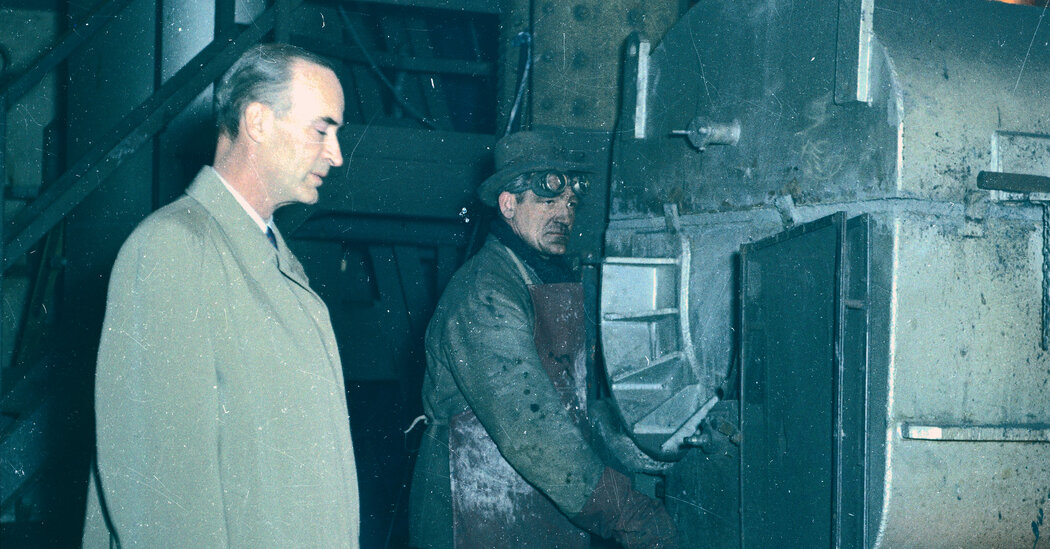
To the Editor:
Re “Stanford, Harvard and NASA Still Honor a Nazi Past,” by Lev Golinkin (Opinion guest essay, Dec. 16):
I read this article with interest, as I grew up in Huntsville, Ala., where Wernher von Braun lived, and graduated from the University of Alabama in Huntsville. Both are mentioned as lauding von Braun while overlooking his past, which included membership in the Nazi Party, membership in the SS, and participation in slave labor and related brutality.
The article is accurate: Von Braun was admired and celebrated in Alabama for his rocketry achievements, and his Nazi past was not discussed. I agree we should no longer defer the discussion.
What has troubled me the most about the German families I knew in Huntsville, which likely included former Nazi Party members, is that they seemed just like mine. They celebrated Christmas, went to the movies, socialized with friends, and revered science and the arts. They seemed like good people, not at all like the evil Nazis I had read about in history class. I wondered, if they are so much like us, could we someday be like them? Could it happen here?
My own answer: Nazi Germany was an example of what can happen in a supposedly civilized nation when the darker angels of human nature go mad.
Yes, we should ask hard questions regarding the Krupps and von Brauns. We should ask the same questions of our own history.
Greg Smith
Centennial, Colo.
To the Editor:
Here in Munich we have the excellent Deutsches Museum with a new astronautics exhibition featuring rockets, which opened this summer. There’s a complete V2 rocket in the exhibition, but even there, Wernher von Braun’s name is not prominently displayed. Von Braun, or to give him his full title, SS-Obersturmbannführer von Braun, is someone the Germans would prefer to forget.
I don’t doubt that, like many Germans, he was an opportunist who gradually cooled to Hitler when he saw how things were going. But does that really make him an American hero? He’s tainted, and, at the very least, there should be a clear explanation of his background.
The U.S. has gradually been coming to terms with the legacy of slavery; the murky history of employing war criminals should also be acknowledged.
Alec Clelland
Höhenkirchen, Germany
To the Editor:
Lev Golinkin bemoans Harvard, Stanford and NASA’s honoring Nazis. We can equally bemoan the fact that the first president of the United States was a slaveholder, as was the principal writer of the Declaration of Independence, both of whom we honor.
Some of our heroes participated in dreadful acts. Those actions are realities that cannot be erased. History requires that we accept a number of painful truths. Accepting them does not mean condoning them. It does require not forgetting them.
Sidney Weissman
Highland Park, Ill.
The writer is a clinical professor of psychiatry and behavioral science.
To the Editor:
As a Stanford junior in 1987 with many distant relatives who had perished as a result of the crimes of men like Alfried Krupp, I was only too happy to take the Krupp Foundation’s money for a three-month internship with a German political party in West Berlin.
With the benefit of the Krupp Foundation’s stipend, I had the time of my life in a fascinating city with a very complex past. I knew exactly where the money came from and viewed it as a form of reparations, and presumably the Krupp family did, too.
So, I disagree with Lev Golinkin’s premise. Would it have been better had the Krupp family kept all of their misbegotten fortune for themselves? Absolutely not.
Gregg Shapiro
Brookline, Mass.
To the Editor:
What better sardonic comment about Harvard’s current adulation of a Nazi than the brilliant song by Tom Lehrer, a Harvard graduate, with this damning verse:
Don’t say that he’s hypocritical,
Say rather that he’s apolitical.
“Once the rockets are up, who cares where they come down?
That’s not my department,” says Wernher von Braun.
Malcolm S. Mitchell
Aliso Viejo, Calif.
The writer is a graduate of Harvard University.
Wearing Masks No Matter What Others Do
To the Editor:
Re “For Holdouts in Masks, Life Turns Lonelier” (front page, Dec. 27):
This article reinforces a popular bias. By labeling people as “holdouts,” it implies that those of us who take evidence-based Covid precautions are outliers, trapped by our fears.
We outliers have watched people worldwide ignore clear and present dangers, letting their emotions guide their choices. Deciding whether to mask is more nuanced and individual than whether to go along with the crowd.
My wife and I would rather wear masks and risk a stranger’s questioning glance. We visit with others who take similar precautions and avoid venues where caution is thrown to the wind.
You can have an active social life if you pre-test, use HEPA filters and gather at home. We’re rewarded by having avoided something bad happening — and we have a sense of our own agency.
Gary Seeman
Ridgefield, Wash.
To the Editor:
I carry at least one N95 mask with me at all times, and I automatically put it on (or pull it up — it’s often around my neck) when I’m in a store or a Broadway theater or a subway car or a bus or any indoor situation where there’s a gathering of people I don’t know.
It’s clear to me that many other people also carry masks, based on the number who will notice my mask and then put theirs on. If anyone has any doubt about mask wearing, seeing someone else wearing one is often all it takes to nudge them into putting theirs on.
Before the pandemic I used to come down with a wicked cold at least once a year. Since the pandemic started I haven’t been sick once (knock wood), and the only thing I can point to that I have done consistently is to wear an N95 mask in social settings.
I don’t care one whit if someone thinks I’m being overcautious.
Christine Lavin
New York
Inaccessible Historic Houses
To the Editor:
Re “In the Village, Another Piece of the City’s History Is Coming Down” (Real Estate, nytimes.com, Dec. 22), about the demolition of a nearly 200-year-old house on Gay Street in Greenwich Village:
When I look at the photo of the houses on Gay Street, I have, simultaneously, two points of view.
From my first point of view, I see beautiful historic houses, and I feel dismay that one will be torn down.
From my other point of view, which I acquired as I aged, I see houses that are inaccessible. At age 80, when I walk around Brooklyn, I see inaccessible houses everywhere (think brownstones). How exactly do older people manage to get up those stairs into the main floor of all these beautiful houses? How about parents carrying children and groceries? What were the architects who designed these houses thinking?
Alice L. Givan
Brooklyn








